Research Productivity-Visibility-Accessibility and Scholarly Communication in Southern African Universities
Abstract
The project for the revitalisation of Southern Africa's higher education sector is dependent on, among other things, the capacity of the region's universities to produce research, to communicate that research to a broad public audience and to use the research output in the process of educating future generations of graduates. Given this context, research output in the great majority of Southern African universities is barely visible. While the introduction of new digital media may offer greater accessibility and expanded opportunities for the visibility of scholarly communication, this may be insufficient to meet the needs of the many scholars and other actors who seek to build on existing bodies of knowledge, whether to advance society or in order to create knowledge for its own sake. This article reports the findings of two 2008 studies - The state of public science in the SADC region and Opening access to knowledge in Southern African universities. Working within a frame which understands knowledge produced in universities as a public good, this article examines the issues at play in terms of the productivity-visibilityaccessibility of scholarly communications in regional higher education. The conclusion discusses a possible approach to improve such productivity-visibility-accessibility, through the adoption of a strategic vision of open access to knowledge and through consideration of two breakthroughs pertinent to achieving a vision of revitalised higher education in the region.
References
Abrahams, L, Burke, M, Gray, E & Rens, A (2008). Access to knowledge in southern African universities, SARUA Study Series, SouthernAfrican Regional Universities Association, Johannesburg, http://www.sarua.org/?q=content/opening-access-knowledge-southern-african-universities, accessed 21 September 2009.
Academy of Science of South Africa (ASSAf) (2006). Report on a strategic approach to research publishing in South Africa, ASSAf, Pretoria, http://www.assaf.co.za/strat_report.html, accessed 2 December 2007.
African Development Bank (2009a). African statistical yearbook 2009, African Development Bank, Tunis, http://www.afdb.org/en/knowledge/publications/african-statistical-yearbook-2009/, accessed 15 December 2009.
African Development Bank (2009b). Gender, energy and development: Gender, poverty and environmental indicators on African countries,Economic and social statistics division of the Statistics Department, African Development Bank, Tunis, http://www.afdb.org/en/knowledge/publications/gender-poverty-and-environmental-indicators-on-african-countries-2009/, accessed 15 December2009.
African Union (2006). ‘Second decade of education for Africa (2006 – 2015), draft plan of action’, African Union, Addis Ababa, http://www.african-union.org/root/AU/Conferences/Past/2006/August/HRST/Draft%20Plan%20of%20Action-%20B.doc, accessed 21 September2009.
Armstrong, C & Ford, H (2006). Africa and the digital information commons: An overview, The Southern African Journal of Information and Communication, Vol. 7, LINK Centre, University of the Witwatersrand, Johannesburg, http://link.wits.ac.za/journal/j07-armstrong.pdf,accessed 25 September 2009.
Assie-Lumumba, T (2005). Critical perspectives on African higher education, Journal of Higher Education in Africa/RESA, Vol. 3, No. 3, http://www.codesria.org/Links/Publications/jhea3_05/assie-lumumba.pdf, accessed 20 January 2008.
Association of African Universities (AAU) (no date). Renewing the African university, Association of African Universities, Accra, http://aau.org/gc11/adocs/pdf/eng/aau-acu-sauvcaprog.pdf, accessed 21 September 2009.
Benkler, Y (2006). The wealth of networks, Yale University Press, Yale and New York, http://www.benkler.org/Benkler_Wealth_Of_Networks.pdf, accessed 18 March 2008.
Castells, M (1999). Information technology, globalisation and social development, UNRISD Discussion Paper No. 114, September 1999, United Nations Research Institute for Social Development, Geneva, http://www.unrisd.org/unrisd/website/document.nsf/0/F270E0C066F3DE7780256B67005B728C?OpenDocument, accessed 2 September 2008.
Chan, L (2004). Supporting and enhancing scholarship in the digital age: The role of open access institutional repositories, Canadian Journal of Communication, Vol. 9, No. 4, http://www.cjc-online.ca/index.php/journal/article/viewArticle/1455/1580, accessed 25 September 2009.
Creative Commons (no date) About Licenses, http://creativecommons.org/about/licenses/, accessed 10 December 2009.
Etzkowitz, H (2002). MIT and the rise of entrepreneurial science, Routledge, London and New York.
Gaillard, J, Krishna, V & Waast, R (1997). Scientific Communities in the Developing World, Sage, New Delhi.
Garnham, N (2002). Universities, research and the public interest, in Mansell, R, Samarajiva, R & Mahan, A (eds.), Networking knowledgefor information societies: Institutions & intervention, Delft University Press, Delft.
Halliday, L (2001). Scholarly communication, scholarly publishing and the status of emerging formats, Information Research, Vol. 6, No. 4, July 2001, http://informationr.net/ir/6-4/paper111.html, accessed 21 September 2009.
Houghton, J & Sheehan, P (2006). The economic impact of enhanced access to research findings, CSES Working Paper, No. 23, July 2006, Centre for Strategic Economic Studies, Victoria University, Melbourne, http://www.cfses.com/documents/wp23.pdf, accessed 25 September 2009.
Houghton, J (2003). Changing research practices in the digital information and communication environment, Department of Education, Science and Training, Government of Australia, http://www.dest.gov.au/NR/rdonlyres/AC17B809-3896-46E2-920A-0FD5CA29F843/1424/c_res_pract.pdf, accessed 20 January 2008.
Kling, R & Covi, L (1995). Electronic journals and legitimate media in the systems of scholarly communication, CH Working Papers, Department of Information and Computer Science, University of California, Irvine, http://www.chass.utoronto.ca/epc/chwp/kling/, accessed 21 September 2009.
Mouton, J, Boshoff, N, de Waal, L, Esau, S, Imbayarwo, B, Ritter, M & van Niekerk, D (2008). The state of public science in the SADC region,Chapter 4, in Kotecha, P (ed.), Towards a common future: Higher education in the SADC region: Research findings from four SARUAstudies (Study Series 2008), SARUA, Johannesburg, http://www.sarua.org/?q=content/chapter-4-state-public-science-sadc-region, accessed 21 September 2009.
Mouton, J (2007). Science & technology, a baseline study on science and technology and higher education in the SADC region, SARUA, Johannesburg, report prepared by Johann Mouton & team, http://www.sarua.org/files/publications/ST_Full_Report.pdf, accessed 21 September 2009.
Nentwich, M (2003). Cyberscience: Research in the information age, Austrian Academy of Science, Vienna.
Ojedokun, A & Lumande, E (2005). Co-operative electronic networks of academic libraries in Southern Africa, Information Development, Vol.21, No. 1, Sage, https://doi.org/10.1177/0266666905051915
Open Society Institute (2002). Budapest Open Access Initiative, http://www.soros.org/openaccess/read.shtml, accessed 10 December 2009.
Southern African Regional Universities Association (SARUA) (2009). Leadership challenges for higher education in southern Africa, SARUA, Johannesburg, http://www.sarua.org/?q=content/volume-1-number-1-2009-leadership-challenges-higher-education-southern-african-0, accessed 10 December 2009.
Stiglitz, J (1999). Public policy for a knowledge economy, paper presented to Department of Trade and Industry and Center for Economic Policy Research, London, 27 January 1999, http://www.bos.rs/cepit/idrustvo2/tema4/knowledge_economy03.pdf, accessed 21 September 2009.
Tijssen, R (2007). Africa’s contributions to the worldwide research literature: New analytical perspectives, trends, and performance indicators,Scientometrics, Vol. 71, No. 2, pp. 303–327. https://doi.org/10.1007/s11192-007-1658-3
University of Pretoria (no date). ‘University of Pretoria open access mandate’, University of Pretoria http://www.library.up.ac.za/openup/docs/UPmandateAfrica.pdf, accessed 21 September 2009.
Downloads
Published
Issue
Section
License
Copyright (c) 2010 https://creativecommons.org/licenses/by/4.0

This work is licensed under a Creative Commons Attribution 4.0 International License.
How to Cite
- Abstract 337
- pdf 177


.png)